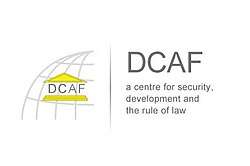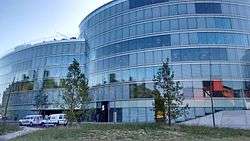DCAF
Coordinates: 46°13′15″N 6°08′37″E / 46.220787°N 6.143574°E
 | |
 Entrance to DCAF headquarters at Petal 5, Maison de la Paix, Geneva | |
| Founded | October 2000 |
|---|---|
| Type | Foundation-based international development think tank |
| Headquarters |
Chemin Eugène-Rigot 2E Geneva, Switzerland |
| Offices | Beirut, Brussels, Ljubljana, Ramallah, Tunis |
| Member States | 62 states and the Canton of Geneva (2016) |
| Permanent Observers | 4 governments, 2 international organisations (2016) |
| Director | Ambassador Thomas Guerber |
| Staff | 171 (2016) |
| Web Address |
dcaf |
| Budget | 24 million CHF (2016) |
DCAF (/ˈdiˌkæf/; Geneva Centre for the Democratic Control of Armed Forces; French: Centre pour le contrôle démocratique des forces armées - Genève, German: Genfer Zentrum für die demokratische Kontrolle der Streitkräfte) is an intergovernmental foundation-based think tank[1] that provides research and project support to states and international actors in improving security sector governance and reform (SSG and SSR).
DCAF was established in 2000 in the Canton of Geneva by the Swiss government and as of 2018 employs around 170 staff, has seven permanent offices and 63 member states.
Mandate
DCAF was established in October 2000 under Swiss law as a foundation and on the initiative of the Swiss government.[2] The organization states that it is a good governance-promoting foundation focusing on a specific public sector area—the security sector. DCAF is mandated by its intergovernmental Foundation Council to assist partner states and international actors in improving the governance of the security sector through reform based on international norms and good practices.[3]
Activities
DCAF states that it provides in‐country advisory support and practical assistance programmes, identifies recommendations and good practices, develops and promotes norms and standards, and conducts tailored policy research.[4][5] In 2017, DCAF supported national and international partners in more than 70 countries. The think tank reports that it collaborates with international organizations, such as the United Nations, NATO, the African Union, the Organization for Security and Co-operation in Europe (OSCE) and the European Union (EU).[6][5]
DCAF was ranked the 33rd (out of 65) in the Top Transparency and Good Governance Think Tanks and the 35th (out of 104) in the Top Defense and National Security Think Tanks on the 2017 Global Go To Think Tank Index The foundation is one of only seven institutions worldwide represented in both categories.[1] Likewise, an external evaluation published in 2014 assessed that DCAF 'has an excellent reputation as an organization with solid expertise'.[7]
Infrastructure, staff and budget
DCAF headquarters is located at the Maison de la Paix complex in Geneva together with its 'sister centres', the Geneva International Centre for Humanitarian Demining (GICHD) and the Geneva Centre for Security Policy (GCSP), as well as the Graduate Institute of International and Development Studies (IHEID) and other peacebuilding-related institutions.[8] In January 2018, DCAF became a member of the Geneva Peacebuilding Platform (GPP), a 'a knowledge hub that connects the critical mass of peacebuilding actors, resources, and expertise in Geneva and worldwide'. DCAF also maintains permanent offices in Beirut, Brussels, Ljubljana, Ramallah, Tripoli, and Tunis.[9][10]
In 2017, DCAF employed 170 staff, of whom 60% were women, from 40 different nationalities. Its budget was 29 million Swiss francs. Switzerland provided approximately 66% of the budget and DCAF's top donors in descending order are currently: Switzerland, Germany, Netherlands, United Kingdom, Sweden, Denmark, Norway, European Union, Luxembourg, Ireland. All funding to DCAF qualifies as official development assistance.[5]
Organization
The Foundation Council is DCAF’s supreme decision-making body.[2] As of 2016 it comprises 62 states and the Canton of Geneva as well as four governments and two international organizations that hold observer status. DCAF is organized as a think-and-do tank and at the headquarters its work is carried out according to four pillars:[5][7][11]
- Policy & Research Department
- Policy & Research Division
- Gender & Security Division
- Public-Private Partnerships Division
- Operations Department
- Southeast Europe Division
- Middle East & North Africa Division
- Sub-Saharan Africa Division
- Eastern Europe, South Caucasus & Central Asia Division
- Asia-Pacific Unit
- Latin America & Caribbean Unit
- International Security Sector Advisory Team (ISSAT)
- Resources Department
- Financial Resources
- Human Resources
- Administration & Support Services
See also
References
- 1 2 McGann, James (2017). 2016 Global Go To Think Tank Index Report. TTCSP Global Go To Think Tank Index Reports. 12. University of Pennsylvania. Archived from the original on 6 June 2017.
- 1 2 DCAF By-Laws (unofficial translation from French). Geneva. 2000.
- ↑ "Geneva Centre for the Democratic Control of Armed Forces (DCAF) | GPPlatform". www.gpplatform.ch. Archived from the original on 24 August 2017. Retrieved 28 May 2017.
- ↑ "DCAF Strategy 2016 – 2019". Geneva Centre for the Democratic Control of Armed Forces (DCAF). 9 June 2015. Archived from the original on 18 September 2017.
- 1 2 3 4 Promoting Good Governance of the Security Sector - DCAF Annual Report 2016. Geneva: Geneva Centre for the Democratic Control of Armed Forces (DCAF). 2017. ISBN 92-9222-437-9. Archived from the original on 15 September 2017.
- ↑ "UNOG - DCAF Seminars". unog.ch. Archived from the original on 2 July 2017. Retrieved 28 May 2017.
- 1 2 External Evaluation of the Geneva Centres, GCSP, GICHD and DCAF (2010-2013). Caslano: INNOVABRIDGE Foundation. 2014. Archived from the original on 2 March 2018.
- ↑ "Disarmament and arms control". Permanent Mission of Finland, Geneva. Archived from the original on 7 November 2017. Retrieved 3 November 2017.
- ↑ "Geneva Centres «Maison de la Paix»". Swiss Federal Department of Foreign Affairs. 30 November 2016. Archived from the original on 24 August 2017. Retrieved 28 May 2017.
- ↑ "Maison de la Paix". www.maisondelapaix.ch. Archived from the original on 6 June 2017. Retrieved 28 May 2017.
- ↑ "Organisational Structure | DCAF a center for security, development and the rule of law". www.dcaf.ch. Archived from the original on 15 September 2017. Retrieved 14 September 2017.
External links
- DCAF official website
- DCAF International Security Sector Advisory Team (ISSAT)
- DCAF Trust Fund for North Africa
- DCAF Tunisia
- DCAF Ukraine
- Inter-Parliamentary Forum on Security Sector Governance in Southeast Asia (IPF-SSG-SEA)
- International Code of Conduct for Private Security Service Providers (ICoC)
- International Conference of Ombuds-Institutions for Armed Forces (ICOAF)
- Législation du secteur de la sécurité en Tunisie (Legislation of the Security Sector in Tunisia)
- Maison de la Paix
- UN Institute for Training and Research (UNITAR)